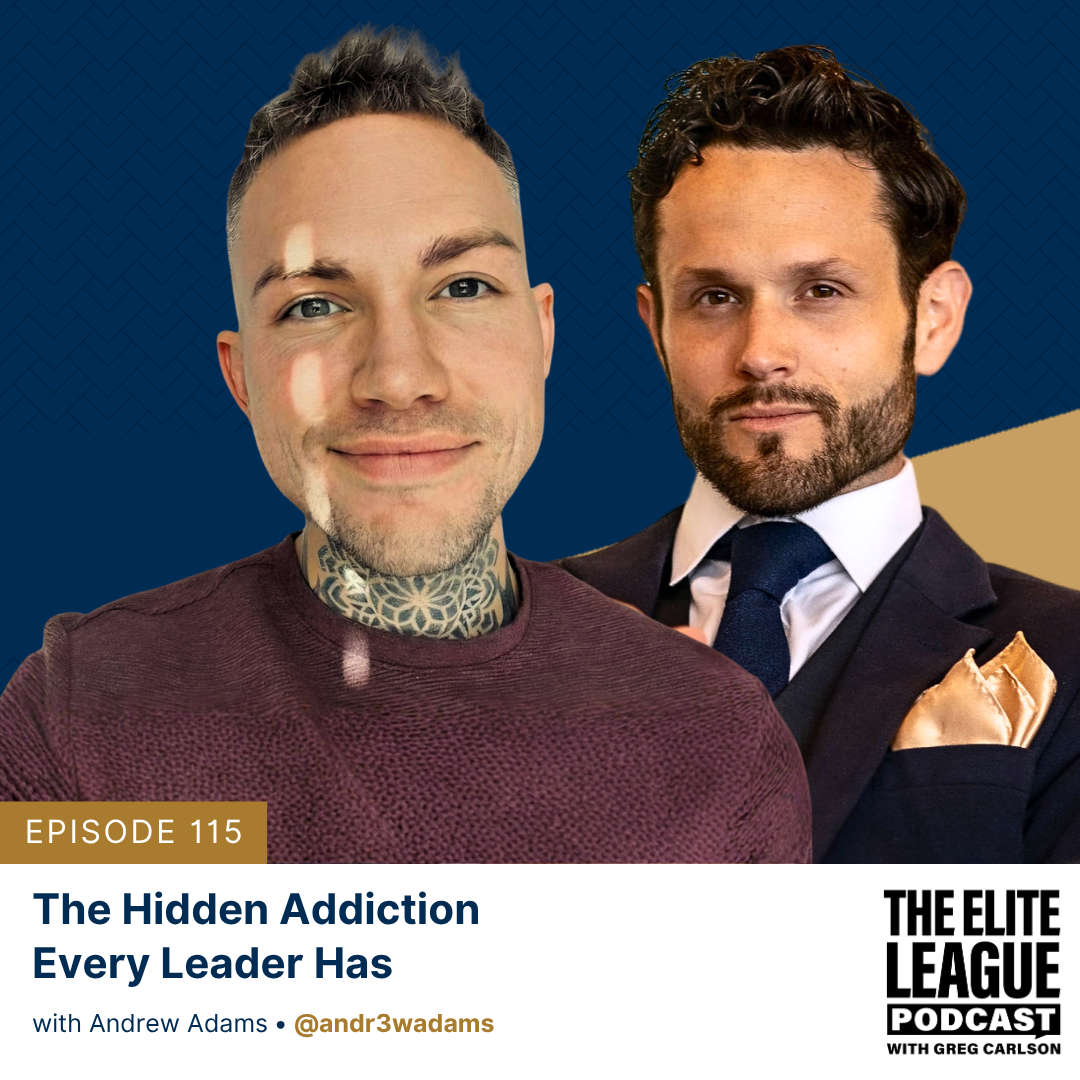Why Power Starts With Awareness
Most entrepreneurs think power is about control over time, money, or people. But true power starts internally: in the ability to stay aware, honest, and in alignment with your own word.
When we talk about “reclaiming power,” we’re not talking about dominance or hustle. We’re talking about regaining ownership of your energy, focus, and decisions. The same foundation that separates great leaders from good ones.
This concept was discussed in The Elite League Podcast, where transformational coach Andrew Adams shared how small acts of integrity and self-awareness rebuild personal power.
Watch the full conversation to learn the tools any CEO can use to improve performance, decision-making, and leadership.
Step 1: Awareness. The Starting Point of Every Transformation
Before you can change behavior, you have to recognize the invisible scripts running your life.
For entrepreneurs, these scripts often sound like:
- “I’m falling behind.”
- “I’m not doing enough.”
- “I should be further along by now.”
These thoughts may seem harmless, but they quietly shape your decisions. They push you toward burnout, comparison, and scarcity thinking.
Awareness is simply noticing — not fixing.
Catch those thoughts when they appear. Don’t fight them, don’t argue — just name them.
🧭 Action step:
Try a “mental check-in” three times a day. Ask yourself:
“What story am I believing right now?”
If it’s rooted in fear, competition, or lack — that’s a sign to pause. Awareness alone breaks the trance.

Step 2: Surrender. Stop Fighting the Data
Entrepreneurs love control. But control can become resistance — especially when it comes to our emotions or mistakes.
Surrender isn’t about giving up; it’s about letting reality be what it is so you can act from clarity, not denial.
If a product failed, surrender means owning that it didn’t work — not blaming the algorithm or the team.
If you feel insecure about your growth, surrender means accepting that emotion as feedback, not weakness.
🧩 Action step:
At the end of the day, list three things that didn’t go as planned. For each one, write:
“What’s the truth here that I’ve been avoiding?”
That one question dismantles ego-driven decision-making faster than any productivity hack.
Step 3: Action. Defy the Limiting Narrative
Once you’re aware of the limiting belief and have surrendered to the truth, it’s time to flip the script.
If your mind says:
“I’m not ready to pitch this idea,”
then your next move is to send the pitch.
If your brain says:
“I don’t have time for self-care,”
that’s the signal to book it into your calendar immediately.
Andrew calls this process a “micro-reclaim” — every small act of courage contradicts the internal story that says you’re not enough.
Each time you act against fear, you reprogram self-doubt into self-trust.
🔥 Action step:
Pick one fear-based behavior and run a 7-day “Opposite Experiment.”
If you usually avoid confrontation, initiate one.
If you procrastinate on calls, make the hardest one first.
The goal isn’t perfection — it’s proving to your subconscious that you can follow through even when uncomfortable.
Step 4: Integrity. The Compound Interest of Self-Trust
Every great leader shares one trait: consistency.
But consistency doesn’t start in boardrooms or goal-setting retreats — it starts with the smallest, most private commitments.
Think about this: when you hit snooze after setting a 5 a.m. alarm, your brain records it as:
“I don’t keep my word.”
It’s not about the lost five minutes — it’s about the erosion of self-integrity.
If you can’t trust your own promises, how can you expect your team, investors, or customers to trust you?
🪞 Action step:
Create one “non-negotiable micro-promise.” It might be as simple as:
- Drinking a full glass of water when you wake up.
- Starting your day without checking your phone.
- Finishing your daily task list before social media.
Each time you keep a small promise, your internal reputation improves. And just like compounding interest, that integrity builds unstoppable confidence.
Why This Matters for Leaders and Founders
Reclaiming power isn’t a motivational idea — it’s operational psychology.
Teams mirror the leader’s energy. If you’re inconsistent, reactive, or disconnected, your culture will reflect that.
When you live with awareness, surrender, action, and integrity, you build what Harvard Business Review calls “psychological congruence” — alignment between what you say and what you do. That’s the invisible force that earns respect, creates loyalty, and fuels long-term growth.
Key Takeaways for Entrepreneurs
- Awareness creates choice. You can’t fix what you can’t see.
- Surrender creates clarity. You can’t strategize around denial.
- Action builds new data. Every time you do the opposite of fear, you create proof.
- Integrity compounds trust. Small daily wins make you magnetic to results and people.
Closing Thought
You don’t have to overhaul your life to reclaim your power. You just have to keep your word — especially when no one’s watching.
Because the leader who keeps promises to themselves becomes unstoppable in keeping promises to others.
👉 Want more strategies like this? Subscribe to Elite League Mastermind, where we break down lessons from The Elite League Podcast and show you how to apply them directly to your business.





Member discussion